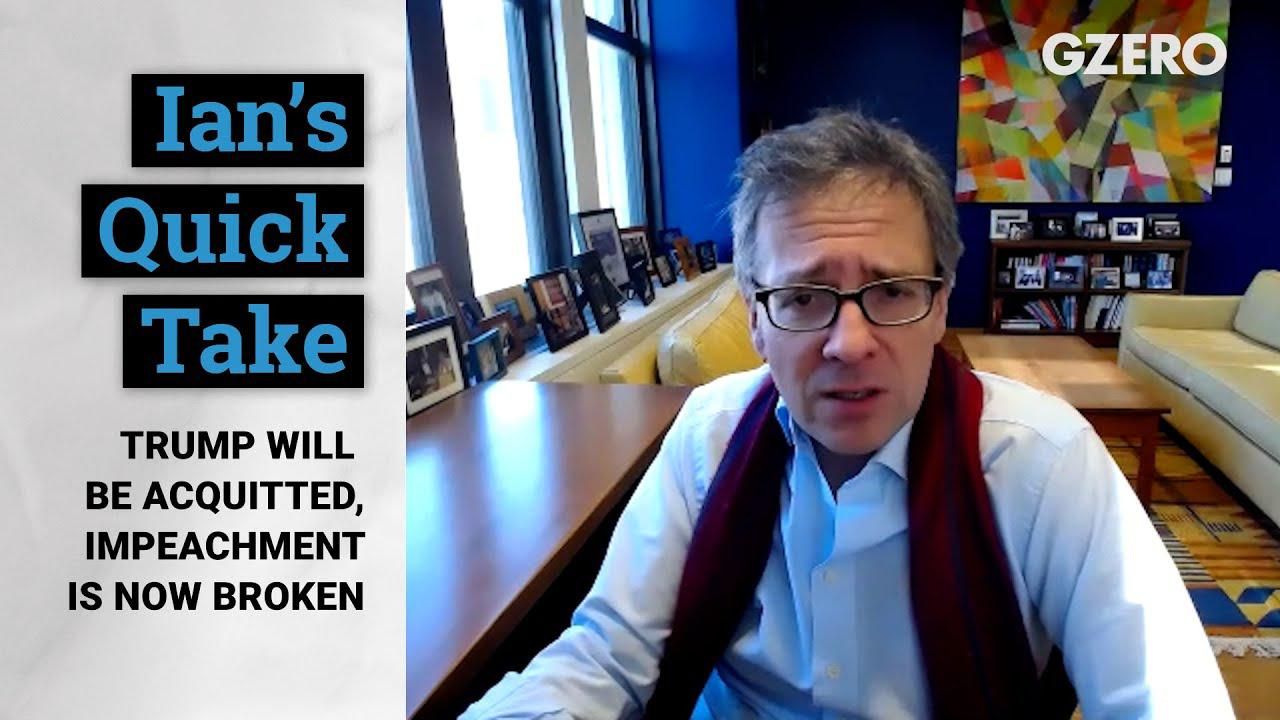
Ian Bremmer's Quick Take:
Hi, everybody. Ian Bremmer here and I've got your Quick Take for the week. The second impeachment trial in the Senate of President Trump, now former President Trump, begins. And Lindsey Graham, Republican senator, has said that we all know what's going to happen. He's right. It's going to be close to a party line vote. A couple senators, maybe a handful, will vote to convict, but the large majority will vote to acquit, which says quite something.
The numbers have moved against Trump to be clear. Back in January, 47% of Americans were saying that the Senate should vote to remove Trump from office. In the last couple of days, those numbers, same poll, both ABC are behind it, 56% of Americans now support the Senate removing Trump. But still, close to a party line vote.
Remember, Trump never quite hit 50% in terms of approval ratings, but that didn't stop him from becoming president, didn't stop him from having an incredible hold on the Republican Party, and that is still true. Most Republicans support Trump. Most support Republicans support Trumpism, and most senators believe they will pay a price, a significant price if they vote against Trump in this impeachment hearing, which is a serious problem. It's all about what you're willing to do publicly for power as opposed to what you believe privately. And there's an enormous gap between the two. We saw that play out over the past several days. Some 11 Republicans prepared to vote in the House to ban Marjorie Taylor Green, the QAnon supporting, legitimately crazy, member of the House, newly elected member of the House from Georgia. 145 Republicans in the House, a strong majority, voted secret ballot in favor of keeping Liz Cheney in her leadership role, despite the fact that she had voted to impeach Trump. And in fact, Liz Cheney this weekend on Fox News, a Fox News interview, actually said about her views of that impeachment vote, what we already know constitutes the gravest violation of his oath of office by any president in the history of the country and this is not something we can simply look past or pretend didn't happen or try to move on. We've got to make sure this never happens again.
Well, certainly if the conviction vote was by secret ballot, maybe that would mean something, but it's not. And so to be very clear, Trump is going to be acquitted. He will be able to run again. And perhaps most importantly, the consequences for sedition, the consequences for actively calling for an insurrection and taking every step possible to overturn the legitimate results of a free and fair election do not include impeachment. Impeachment, I mean, if it doesn't apply for that, then it no longer works. And that's what the American political system is putting on display in the coming weeks, is that impeachment is broken as a political mechanism, which undermines the separation of and the balance of powers in the United States, the world's most powerful representative democracy.
I thought it was interesting, the Economist Intelligence Unit came out last week with the fact that the United States is considered in its model to be a flawed democracy. My only question was what took them so long? This isn't new. It's been coming for decades and the erosion has happened slowly but still very real. And the ability of the United States to make the argument that we're back internationally only makes sense if, and we'll gain alignment from all the allies, if they really believe that this can't happen in the US again. There's no reason to believe that. In fact, there's every reason to believe that it can and will happen again, because it's not about Trump. It's about anti-establishment sentiment in the United States growing much greater as the political institutions are seen to be rigged. And that is both true of the electoral process and now it's true of the impeachment process. It's not everything, it's not the military, it's not the judiciary, but very big pieces of the American political franchise increasingly do not work.
You know, some countries are hybrid economies in the sense that they're sort of between free market and state controlled. Increasingly, the United States is kind of a hybrid democracy. Some of it functions and some of it doesn't. And the fact that the US, because it's so incredibly wealthy and therefore stable, can continue to power through this and not deal with those challenges is itself a problem because it means that you don't address them. And as much as Biden as president himself is oriented to trying to address these challenges, it's very hard to imagine he's going to have a lot of success and the reason will be on full display in the Senate over the next couple of weeks.
So, that's it for me. I hope everyone's being safe, and avoiding people, and be good. Talk to you soon.